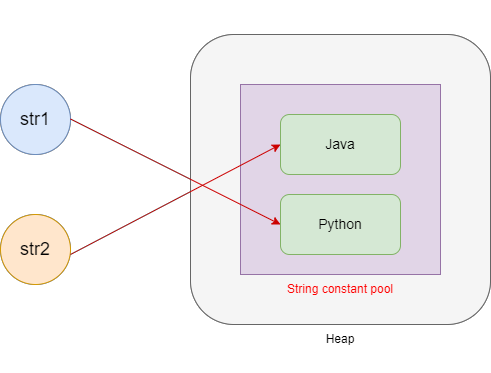Why Are Strings Immutable in Java? Enhancing Code Integrity
Why Are Strings Immutable in Java? Enhancing Code Integrity
Blog Article
What Is Immutable Strings and How It Works
In the realm of programming, understanding the principle of unalterable strings is paramount for developing durable and secure applications. Immutable strings refer to strings that can not be altered after they are produced, making certain data stability and predictability within the code.
The Essentials of Unalterable Strings
Unalterable strings, as an essential concept in shows, are personality sequences that can not be transformed once they are produced. This implies that as soon as a string is assigned a worth, that worth can not be changed. In languages like Python and Java, strings are immutable things, leading to various effects in terms of memory administration and information integrity.
Among the vital benefits of immutable strings is that they supply a complacency in data control. Because the web content of an immutable string can not be changed, it guarantees that the original data remains undamaged, reducing the danger of unintentional adjustments during program execution (Why are strings immutable in Java?). This building additionally simplifies debugging procedures, as developers can trust that when a string is specified, its worth will not be accidentally changed
When a new string is created based on an existing one, instead than modifying the original string, the brand-new value is stored independently. Overall, understanding the basics of unalterable strings is important for grasping programs ideas and maximizing code performance.
Advantages of Unalterable Strings
Building upon the security and performance benefits of immutable strings, their benefits encompass improving code dependability and simplifying concurrent programming jobs. By being immutable, strings can not be modified after production, which removes the danger of unexpected modifications in the data they store. This integral immutability makes sure that when a string is produced, its worth remains constant throughout the program's execution, minimizing the chances of pests brought on by unexpected changes.
In addition, unalterable strings add to code integrity by making it less complicated to reason regarding the state of a program. Since strings can not be transformed, designers can rely on that a string will always hold the very same value, streamlining debugging and maintenance efforts. This predictability causes extra steady and trustworthy codebases.

Execution in Programming Languages
Within numerous shows languages, the consolidation of unalterable strings is a basic aspect that influences how information is managed and controlled within code frameworks. The application of unalterable strings differs across various programs languages, with each language using its very own devices to sustain this principle.

On the other hand, languages like C and C++ do not have built-in support for unalterable strings. Developers in these languages must by hand execute immutability by applying rules within their code to stop straight modifications to string things.
Best Practices for Working With Unalterable Strings
When managing immutable strings in programming languages like Java and Python, sticking to best methods ensures effective and safe information adjustment. One of the essential finest techniques is to utilize StringBuilder or StringBuffer instead of straight manipulating strings, specifically when dealing with substantial concatenation operations. These courses offer mutable options for string control, helping to stay clear of unnecessary our website memory allowances and boosting efficiency.
One more finest method is to make use of string interpolation or format operates given by the language as opposed to hands-on concatenation. This not only enhances readability yet additionally help in avoiding usual challenges such as unintentional string modifications. Additionally, when collaborating with sensitive information such as passwords or API tricks, it is vital to prevent storing them as ordinary text in immutable strings. Making use of protected storage mechanisms like char arrays or specialized libraries for taking care of sensitive details assists mitigate protection threats related to unalterable strings.
Real-world Applications and Instances
Checking out sensible applications of unalterable strings in numerous markets exposes their substantial effect on information honesty and system reliability. In the medical care market, unalterable strings play a crucial function in ensuring the security and confidentiality of person data. By preventing unapproved adjustments to delicate details such as medical records and prescriptions, unalterable strings help preserve conformity with rigorous personal privacy laws like HIPAA.
Financial organizations additionally profit from the immutable nature of strings to improve the safety and security of consumer data and purchase records. Unalterable strings aid prevent scams and unapproved modifications to financial details, giving a robust protection versus cyber dangers and ensuring the count on and confidence of customers.

Verdict
Finally, unalterable strings are repaired and unchangeable sequences of characters that offer advantages such as thread safety and enhanced performance in programming. They are executed in different programming languages to make certain information honesty and protection. Ideal techniques for collaborating with immutable strings include avoiding direct adjustments and making use of approaches that return new string objects. Real-world applications of immutable strings consist of data file encryption, caching, and string adjustment tasks.
Unalterable strings refer to strings that can not be modified after they are developed, making certain information integrity and predictability within the code. When a new string is created based on an existing one, rather than modifying the original string, the new value is stored individually.In languages like Java and Python, strings are unalterable by default, suggesting that when a string item is created, its value can not be altered - Why are strings immutable in Java?. Best methods for working with immutable strings include look at here staying clear of straight modifications and using approaches that return new string items. Real-world applications of immutable strings include information file encryption, caching, and string adjustment jobs
Report this page